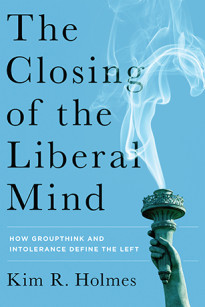Liberalism “has run its course,” says S. Adam Seagrave in his review of Kim R. Holmes’s The Closing of the Liberal Mind. It is a book that “interweaves abstract philosophy with history, empirical data, and concrete narrative,” and is an insightful revelation of how liberalism lost its way:
Is liberalism dead? The shadow of this troubling question overhangs much of the sweeping, profound, and timely narrative of Kim R. Holmes’s new book,The Closing of the Liberal Mind. In his acknowledgments, Holmes helpfully reflects that “the history of ideas involves a complex interaction between people’s thoughts and deeds that often remains as elusive as an evening breeze.” As elusive as this interaction can indeed often be, Holmes tracks the evening breeze remarkably closely and faithfully throughout the book.
The metaphor is particularly apt in the case of Holmes’s subject, which involves a story of “tragedy,” of “closing,” and of the symbolic extinguishing of the bright flame of liberty represented on the book’s cover. Like a few other recent works with depressing Tocquevillian twists, such as Paul Rahe’s Soft Despotism: Democracy’s Drift or Robert Putnam’s Bowling Alone, Holmes argues that the early promise of liberalism in its “classical” or “moderate” guise has given way to a noxious blend of individualism, subjectivism, relativism, atheism, and nihilism. The promising dawn of liberal modernity in the thought of John Locke and the American founders has run its course and turned to the dusk of its dark “postmodern” twin…
Holmes’s tracing of this development is clear, concise, and accessible. It is likely to be equally interesting and illuminating to the specialist and the layman, which is a significant and difficult achievement. Holmes’s explanations of the differences between postmodernism and existentialism early in the book and his later discussion of Kant as “a bridge from the radical enlightenment to the modern world” are especially excellent and valuable. Throughout the book, Holmes interweaves abstract philosophy with history, empirical data, and concrete narrative in an exemplary and engaging manner.
Holmes successfully and thoroughly establishes his thesis: that the liberals of today have in fact turned sharply away from the liberal tradition—not only classical liberalism but also the progressive liberalism of the early twentieth century—and have followed instead the “postmodern” development of an anti-Enlightenment and illiberal strain of thought. This is the same strain of thought that gave us both communism on the left and fascism on the right. Although its manifestation in American “postmodern leftists” is unlikely to inspire the violent totalitarianism associated with these ideologies, Holmes provides numerous examples of the ways in which it has given rise to a more subtle authoritarianism.
It is difficult to quarrel with Holmes’s pessimistic diagnosis of American political culture in its embrace of postmodernism, and its accompanying rejection of the moderate liberalism that has characterized much of the American political tradition. If liberalism in the United States is not already dead, it is undoubtedly in critical condition. Holmes is right that Rome is burning, and at various points he provides crucial hints for what we non-fiddlers might do to save it
Read the entire review here. And trace the devolution of liberalism in Kim R. Holmes’s The Closing of the Liberal Mind.
